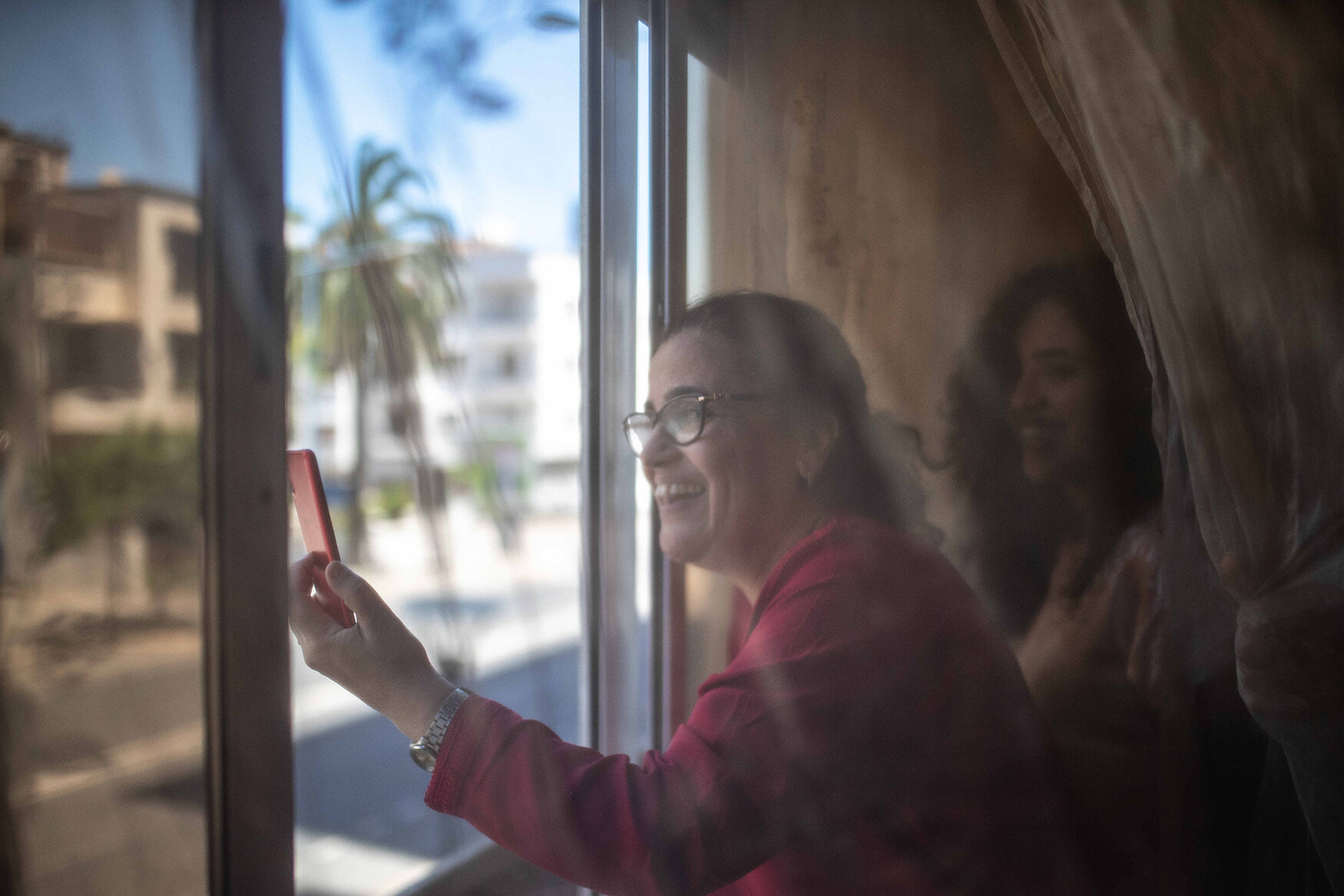Moroccans feast, light up sky on Shiite holy day

Women thrumming drums, children devouring rich pastries, red flares lighting up the sky — these are telltale signs that Moroccans are marking Ashoura.
The holy day observed this week commemorates the death of Imam Hussein, the grandson of the Prophet Muhammad. While he was one of Shiite Islam’s most important figures, the holiday is also marked in some largely Sunni countries like Morocco.
In most places, Ashoura is an emotional time in remembrance of the historic events that led to Hussein’s death. Hussein’s killing has been attributed with cementing the schism between Shiite and Sunni Islam.
While in countries such as Iraq believers weep over his death or beat their own backs with chains, in Morocco, religious and cultural traditions give the day a unique celebratory atmosphere.
Boys stand atop a hill where a bonfire is lit in celebration of Ashura, in Sale, near Rabat, Morocco, Sept. 9, 2019. (AP Photo/Mosa'ab Elshamy)
Families gather at home to eat a variety of sweets, dried fruits, and pastries that are served up throughout the Ashoura week. Traditional couscous meals with meat and vegetables are cooked, as women sing songs that are chanted to the beat of newly-bought Taarejs, colorful drums which are given as gifts to children. Girls get traditional henna tattoos for the occasion.
The rituals don’t end there.
As night falls, people spill out onto the streets. Children light sparklers and ask for treats, in an atmosphere reminiscent of Halloween.
Crowds of youths in cities like Sale on the Atlantic Coast ignite flares and fireworks — despite an annual crackdown on sales by authorities in an effort to reduce the risk of accidents.
In open spaces, young people drag tires and light them up, as residents gather to watch a huge bonfire blaze under the night sky.
A boy wearing a vendetta mask drags a tire to be lit in a bonfire as part of Ashura celebrations, in Sale, near Rabat, Morocco, Sept. 9, 2019. (AP Photo/Mosa'ab Elshamy)
Girls carry a tray and play with drums outside their home to collect treats and dry fruits, in celebration of Ashura, in Sale, near Rabat, Morocco, Sept. 9, 2019. (AP Photo/Mosa'ab Elshamy)
Girls carry a tray outside their home to collect treats and dry fruits, in celebration of Ashura, in Sale, near Rabat, Morocco, Sept. 9, 2019. (AP Photo/Mosa'ab Elshamy)
People shop for dry fruits at a shop in celebration of Ashura, in Salé, near Rabat, Morocco, Sept. 9, 2019. (AP Photo/Mosa'ab Elshamy)
Women and children gather at a home to celebrate the occasion of Ashura, in Sale, near Rabat, Morocco, Sept. 10, 2019. (AP Photo/Mosa'ab Elshamy)
Woman and children eat dried fruits and treats at a home to celebrate the occasion of Ashura, in Sale, near Rabat, Morocco, Sept. 10, 2019. (AP Photo/Mosa'ab Elshamy)
A young girl gets a henna tattoo to celebrate the occasion of Ashura, in Sale, near Rabat, Morocco, Sept. 10, 2019. (AP Photo/Mosa'ab Elshamy)
A youth pours kerosene over tires to light a bonfire in celebration of Ashura, in Sale, near Rabat, Morocco, Sept. 9, 2019. (AP Photo/Mosa'ab Elshamy)
Youths, mostly football ultras, light flares in celebration of Ashura, in Sale, near Rabat, Morocco, Sept. 9, 2019. (AP Photo/Mosa'ab Elshamy)
A child runs with a sparkler as a bonfire is lit in the distance in celebration of Ashura, in Sale, near Rabat, Morocco, Sept. 9, 2019. (AP Photo/Mosa'ab Elshamy)
Youths react during the celebration of Ashura, in Sale, near Rabat, Morocco, Sept. 9, 2019. (AP Photo/Mosa'ab Elshamy)
Youths, mostly football ultras, light flares in celebration of Ashura, in Sale, near Rabat, Morocco, Sept. 9, 2019. (AP Photo/Mosa'ab Elshamy)
Text from AP News story AP PHOTOS: Moroccans feast, light up sky on Shiite holy day by Mosa’ab Elshamy.
Photos by Mosa’ab Elshamy





